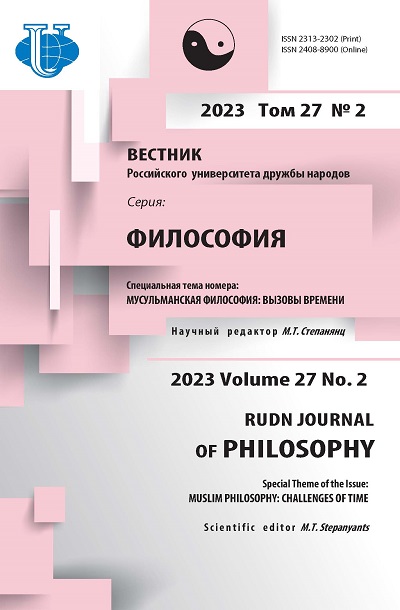History, its Origins, and End in Context of Philosophy of Liberation
- Autores: Kryshtop L.E.1, Basmanov A.V.1
-
Afiliações:
- RUDN University
- Edição: Volume 27, Nº 2 (2023): MUSLIM PHILOSOPHY: CHALLENGES OF TIME
- Páginas: 431-442
- Seção: SCIENCE, HISTORY, CULTURE
- URL: https://journal-vniispk.ru/2313-2302/article/view/325270
- DOI: https://doi.org/10.22363/2313-2302-2023-27-2-431-442
- EDN: https://elibrary.ru/INBNHW
- ID: 325270
Citar
Texto integral
Resumo
The article concerns history, its origins, goals, and end. The article focuses on two concepts of historical development. One is the concept of the “end of history” by Francis Fukuyama. The article’s authors consider in detail the main provisions of this concept. However, the main emphasis is on the critical reception of this concept within the framework of the philosophy of liberation (represented by Arturo Andrés Roig). Roig’s criticism reveals the Eurocentrism inherent in this concept and shows that it carries the main features inherent in the European worldview and European mentality, which is why it is initially perceived as unsuitable for the Latin American continent. The second concept of historical development analyzed in this article is the earlier concept of the “Axial Age” by K. Jaspers. This concept is often perceived as one of the most striking anti-Eurocentric concepts. At the same time, Jaspers himself is regarded as the founder of the dialogue of cultures and intercultural philosophy and a supporter of civilizational pluralism. The article consistently analyzes three aspects of this concept - the motivation for its creation (presented by Jaspers himself), the criteria for identifying historical and prehistoric cultures (and the associated identification of three centers of the axial period), and the question of the possibility of a new axial age. The article argues that Jaspers’ concept can rightly be called Eurocentric rather than anti-Eurocentric, since both in the initial motivation for creating this concept and in the process of its development and vision of the prospects for the possibility of a new axial age, Jaspers proceeds from the presuppositions characteristic of the European worldview, which is universalized by him and presented as objective and the only correct ones. Ultimately, the study shows that the fight against Eurocentrism is a logical continuation of the latter and carries all the main features of the European mentality.
Palavras-chave
Sobre autores
Ludmila Kryshtop
RUDN University
Autor responsável pela correspondência
Email: kryshtop-le@rudn.ru
ORCID ID: 0000-0002-1012-5953
Doctor in Philosophy, Рrofessor, Department of History of Philosophy
6, Miklukho-Maklaya St., Moscow, 117198, Russian FederationAlexey Basmanov
RUDN University
Email: basmanov-av@rudn.ru
ORCID ID: 0000-0003-2100-9648
Master’s degree in History of Philosophy, teacher, Department of foreign languages
6, Miklukho-Maklaya St., Moscow, 117198, Russian FederationBibliografia
- Lyotard J-F. Postmodern state. Moscow: In-t eksper. Sotsiologii; 1998. (In Russian).
- Habermas J. Philosophical discourse on modernity. Twelve Lectures. Moscow: Izdatel’stvo “Ves’ mir”; 2008. (In Russian).
- Niethammer L. Posthistoire. Ist die Geschichte zu Ende? Reinbek, Hamburg: Rowohlt Verlag; 1989.
- Fukuyama F. The End of History? Available from: https://nsarchive.gwu.edu//rus/text_files/EastUropeProblems/1989-27-28/27-28-84-118.pdf (accessed: 20.11.2022).
- Malakhov VS. Once again about the end of history. Voprosy filosofii. Available from: http://philosophy1.narod.ru/www/html/library/vopros/45.html (accessed: 20.11.2022). (In Russian).
- Petyaksheva NI. Latin American “philosophy of liberation” in the context of comparative studies. Moscow: “Unicum Center”; 2000. (In Russian).
- Demenchonok E. Book reviewing. Concordia. 1995;(28):97-101.
- Roig AA. Rostro y filosofía de América Latina. Mendoza: Editorial de la Universidad Nacional de Cuyo (EDIUNC); 1993.
- Roig AA. El pensamiento latinoamericano y su aventura. Buenos Aires: Centro Editor de América Latina; 1994.
- Heit H. Breakthrough to Transcendence? Three Concepts of Inter-Cultural Philosophy (Leibniz, Hegel, Jaspers). Existenz. 2019;14(1):107-114.
- Nelson ES. Introduction to the Special Theme on Hegel in Intercultural and Critical Perspective. Front. Philos. China. 2018;13(4):479-482.
- Boy JD, Torpey J. Inventing the axial age: the origins and uses of a historical concept. Theory and Society. 2013;42(3):241-259.
- Jaspers K. The origins of history and its purpose. In: The meaning and purpose of history. Moscow: Politizdat; 1991. (In Russian).
- Semushkin AV. “Axial time” as a condition and prerequisite for the genesis of philosophy in the West and East. RUDN Journal of Philosophy. 2006;12(2):40-49. (In Russian).
- Boy JD. The Axial Age and the Problems of the Twentieth Century: Du Bois, Jaspers, and Universal History. The American Sociologist. 2015;46(2):234-247.
- Assmann A. Einheit und Vielfalt in der Geschichte. Jaspers' Begriff der Achsenzeit neu betrachtet. In: Kulturen der Achsenzeit II, Ihre institutionelle und kulturelle Dynamik. Tl. 3. Eisenstadt ShN, editor. Frankfurt am Main: Suhrkamp; 1992. S. 330-340.
- Vattimo J. After Christianity. Moscow: Three squares; 2007. (In Russian).
Arquivos suplementares








